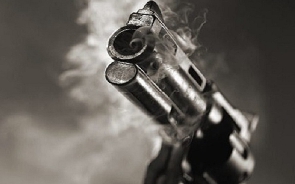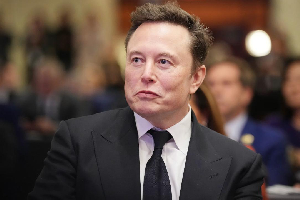By Kwame Okoampa-Ahoofe, Jr., Ph.D.
It also ought to be deliberately and meticulously pointed out that Mahoney’s JFK: Ordeal in Africa does quite a worthwhile job in underscoring the oft-ignored fact that like most personalities abruptly thrust on the cusp of history, Kwame Nkrumah was no cartoon character, his well-documented egregious and serious personal and ideological flaws notwithstanding. And on this score, this is what Mahoney has to report: “What the Americans did not seem to realize was that for all his vanity, Nkrumah was a subtle and disarming supplicant. How else could one explain his extraordinary odyssey from the obscure shade of colonialism in a remote village in southwestern Ghana to Balmoral Castle, where he dined, as head of state, with the Queen of England?” (166).
Mahoney also reports quite bluntly that Nkrumah’s March 8, 1961 meeting with President Kennedy went poorly, the meeting having been literally rained upon, although by the end of it all, the Ghanaian leader had succeeded in getting Kennedy to fully back the Volta River Project (167). What was most remarkable about the Kennedy-Nkrumah meeting regarded a historic quote that Mr. Kennedy had borrowed from the legendary U.S. President Thomas Jefferson. It went as follows: “The disease of liberty is catching.” Kennedy, however, was to ironically add that, “It has been the object of our guest’s life to make sure that that disease spreads around the globe” (167).
In theory, of course, Kennedy was dead-on accurate in his encomium; however, chaotic events on the ground four years into Ghana’s independence clearly indicated that Nkrumah squarely expected to be in control of the kind of “disease of liberty” that both Presidents Jefferson and Kennedy were talking about. In other words, it clearly appears that in the grossly outsized and megalomaniacal imagination of Mr. Kwame Nkrumah, it was the unique opportunity for him to be able to dominate all else that mattered most.
The first serious attempt to topple the Nkrumah government appears to have occurred in late 1961, when the rather naively self-assured Ghanaian leader spent two months effectively out of the country touring the erstwhile Eastern-bloc countries, largely the Soviet Union and China. He would return to a highly charged atmosphere of chaos and rampantly running labor strikes as well as political intrigues among the ranks of his own cabinet. His rather desperate and strategically unwise decision to farm out the training and equipping of the Ghana Armed Forces to the Russians provoked acute discontent among the ranks of the largely Western-trained officer ranks of the military. The first most potentially successful coup attempt against Nkrumah imploded, after the alleged chief coup-plotter, Brigadier-General Joseph E. Michel, suddenly died in a plane crash in Ghana on September 3, 1961 (Mahoney 171). There is plausible speculation here that it was, indeed, this “chief conspirator,” as Mahoney describes Brigadier-General Michel, after whom the military garrison in Tema, near Accra, was named.
The most elaborately sustained attempt to overthrow Nkrumah, however, was engineered by Mr. Komla A. Gbedemah, the very same man who had vigorously campaigned to get the politically imprisoned future Prime Minster Nkrumah elected to the legislative assembly. Regarding Mr. Gbdemah’s attempt to “palatially” oust then-Prime Minister Nkrumah, Mahoney writes at length: “Despite the virtual paralysis of his country, Nkrumah elected to remain in Russia. Former Finance Minister Gbedemah (then serving on the three-man presidential commission ruling in Nkrumah’s absence) saw his chance to seize power. Gbedemah had no problem in obtaining CIA backing for his conspiracy, but he wanted an official assurance of American support. He approached Ambassador Russell on September 6 and told him of his plans. Would the U.S. support him? Washington gave an unequivocal yes.
¶ “Nkrumah returned to Ghana on September 16 and demanded on national radio that striking workers return to their jobs. The next day 3,000 skilled and semi-skilled workers struck in Accra. Railroad and dock workers in Takoradi also ignored the directive and appealed to American, British, Liberian and Nigerian unions for financial support. Nkrumah thereupon dismissed four of his cabinet ministers (including Gbedemah), and relieved all 230 British officers of their command positions (including his chief of staff, General H. T. S. Alexander). He warned the strikers for the final time to return to work. This time they obeyed” (172-3).
Further, Mahoney notes: “George Ball, who was monitoring cable traffic from Ghana, urged the President to sit tight on the Volta decision; there was a chance that Nkrumah might be overthrown in the next couple of weeks and a ‘really solid government’ would be installed. The State Department also wanted ‘to see if Gbedemah get anywhere.’
¶ “Gbedemah, however, proved to have little aptitude for intrigue. He seemed to want the Americans to do the work for him and spent as much time plotting with the CIA station chief in Accra as he did with other Ghanaian conspirators. Also assisting Gbedemah was the local agent of a New York diamond merchant, Leon Tempelsman and Son. The son, Maurice Tempelsman [who would later become romantically involved with the widowed former U.S. first lady Jacqueline Kennedy Onassis], was a friend and political supporter of Adlai Stevenson and had a liking for mixing conspiracy with commerce in his African trade. A few days after Nkrumah dismissed him from the cabinet, Gbedemah sent a letter to [former Michigan State] Governor [G. Mennen] Williams detailing those involved in the plot and requesting money. Kennedy was apprized of this unusual message at [his family’s estate in] Hyannis Port [Massachusetts] and instructed Bundy not to respond.
¶ “Whatever chance Gbedemah may have had of ousting Nkrumah was lost when Tempelsman’s agent in Ghana, Mr. Grosse, called his employer on an open transatlantic line and ‘spilled everything,’ including his assurance to Gbedemah of U.S. support. As U.S. officials feared, the line had been tapped by Ghanaian security agents.
¶ “Washington prepared for the worst. Grosse had apparently compromised ‘everybody,’ including the top CIA man in Accra. Bronson Tweedy, the CIA chief of Africa operations, was summoned to his office on Saturday to attend to the damage. Ball telephoned Tempelsman and coldly informed him that Mr. Grosse had been ‘quite indiscreet’ and should be pulled out.
¶ “Nkrumah, who had generally been restrained in his use of the security apparatus until this point, now struck back. In early October, he ordered the arrest of forty-eight persons (including three MPs) under the Preventive Detention Act. Ball briefed Bundy on the situation, Gbedemah was under surveillance and might be arrested and shot. The affair might be identified as an American plot. Maybe the Ghanaians didn’t have a recording of the telephone conversation, Bundy ventured. That was a possibility, Ball replied. ‘We might be lucky but we didn’t deserve that sort of luck.’
¶ “On October 31, the Ghanaian Parliament passed a bill requested by the President to establish special, nonjury courts that could order the death sentence for political offenses with no right of appeal. In late October, Gbedemah fled the country. ¶ …. ¶ …. ¶ …. ¶ …. Volta Dam or not, September 1961 marked the beginning of the end of Nkrumah’s relationship with the West” (JFK: Ordeal in Africa 173-5).
What is rather fascinating about the foregoing account by Mahoney is, of course, the fact that at no point in the author’s quite detailed narrative about Gbedemah’s elaborate and long-running conspiracy to overthrow President Nkrumah does the name of Dr. J. B. Danquah, or any of his close associates among the formidable ranks of the Ghanaian opposition drop in. what the foregoing clearly means is that there existed at least a critical mass of malcontents among the higher echelons of Nkrumah’s own government who wanted their increasingly insufferable proverbial drum-major for liberty radically removed from the scene. But what is even more fascinating is the fact that, somehow, even widely touted CPP loyalists like Gbedemah appeared to have cynically put their own material well-being far ahead of the commonweal or the greater national good. And the latter largely explains why “Afro Gbede” would write a letter to Governor G. Mennen Williams implicitly seeking to be heartily congratulated, while also simultaneously and shamelessly demanding to be paid for being able to assemble a panoply of conspirators who were ready to give the Show Boy the heave-ho.
In other words, Gbedemah cuts the pathetic portrait of a hardnosed mercenary who clearly appears to have been far more interested in playing up to American policy designs on Ghana, and Africa at large, rather than genuinely assisting his countrymen and women in charting a more democratic and progressive political course, once Nkrumah and his tautological CPP regime had been ousted. On a deeper and more troubling level, Mahoney’s narrative offers a very tragic commentary on the caliber of leaders, Nkrumah included, of course, who officially led Ghana into postcolonial sovereignty.
*Kwame Okoampa-Ahoofe, Jr., Ph.D., is Associate Professor of English, Journalism and Creative Writing at Nassau Community College of the State University of New York, Garden City. He is Director of The Sintim-Aboagye Center for Politics and Culture and author of “Dr. J. B. Danquah: Architect of Modern Ghana” (iUniverse.com, 2005). E-mail: okoampaahoofe@optimum.net.
###
Opinions of Thursday, 19 January 2012
Columnist: Okoampa-Ahoofe, Kwame
Richard Mahoney: On Danquah And Nkrumah – Part Four
Opinions













